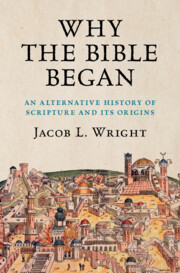Part II - Admitting Defeat
Published online by Cambridge University Press: 13 July 2023
Summary
Having traced the rise and fall of two related kingdoms, we are now in a better position to address more directly the why and wherefore of the Bible’s beginnings. Part I began to demonstrate that the primary factors behind the Bible’s formation are political division and military defeat. As we explore these factors more directly in Part II, we will learn how they are closely related to the Bible’s distinctive didactic qualities.
- Type
- Chapter
- Information
- Why the Bible BeganAn Alternative History of Scripture and its Origins, pp. 135 - 236Publisher: Cambridge University PressPrint publication year: 2023



